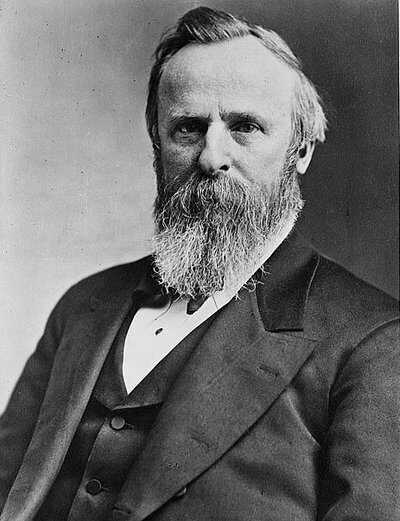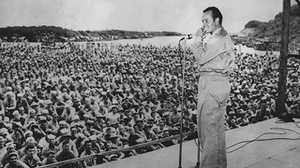19th President

Terms: 1877-1881
Political Party: Republican
First Lady: Lucy Ware Webb Hayes
Vice President: William Wheeler
Overview
Born: October 4, 1822, in Delaware, Ohio... Hayes' reputation as a man of integrity proved a welcome relief from Andrew Johnson's contentious and Ulysses Grant's scandal-ridden administrations, although the election that put Hayes in office was one of the most corrupt in history. He ended Reconstruction in the South and established some civil service reforms. Hayes' appointments included Democrats and Southerners -- ex-Confederates. During his presidency, the White House joined the temperance movements in banishing alcohol from the premises. Died: January 17, 1893
The Era
Thomas Edison invents the lightbulb (1877)
Gilbert and Sullivan premiere their opera, H.M.S. Pinafore (1878)
Domestic Policy
Soon after his election, Hayes began dismantling the Reconstruction regime imposed on the defeated Southern states (a condition of the back-room dealings that led to his election). Reconstruction had antagonized the South against Northern military occupation, but the absence of Reconstruction allowed the Democratic Party to establish a Southern stronghold -- one that denied civil rights to blacks. Within the government, Hayes established some important reforms. His appointments did not favor party loyalty as much as competence, and he made an executive order that government employees could not be solicited for party campaign funds.
Foreign Affairs
Foreign policy in the Hayes era turned westward toward the Pacific. The president announced an intention to build a U.S.-controlled Central American canal to aid transport to the west coast. Out in California, the Chinese immigrant population grew at a rate that prompted Hayes to negotiate a trade agreement with the Chinese that would regulate immigration to the U.S. In support of East Asian trade, the president established a treaty with Samoa for the use of a port. Hayes' sense of fair play also served him well in ending skirmishes between Mexico and Texas.
Presidential Politics
When he was nominated by the Republican Party for president in 1876, Hayes' resume included service as a Civil War officer, a congressman and a governor of Ohio. Projecting a moral and honest reputation, Hayes left much of the campaigning to others. The night of the election, he went to bed convinced the Democrat Samuel Tilden had won. Indeed, Tilden had more popular votes, but the electoral college contest was a squeaker. By January a joint committee of Congress and the Supreme Court decided by a bare majority (split on party lines) to award four disputed state contests to Hayes; he won the presidency 185 electoral votes to 184. Hayes kept his pledge to limit his presidency to one term.







